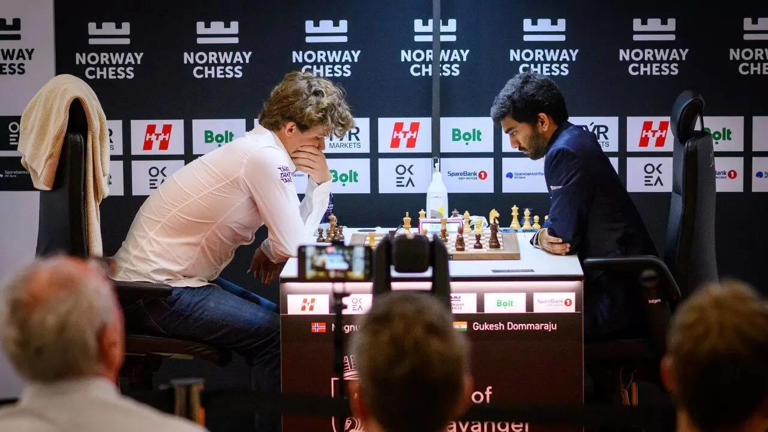In a stunning display of poise and precision, Indian teenage Grandmaster D. Gukesh defeated former World Champion Magnus Carlsen in the sixth round of the Norway Chess 2025 tournament, marking his first-ever classical win over the Norwegian icon and shaking up one of the world’s most prestigious chess events.
The game, held in Stavanger on June 1, unfolded over four grueling hours and 62 moves. For much of the match, Carlsen held a comfortable position, pressing with strategic clarity and dominating the board deep into the endgame. Yet a rare miscalculation on move 52 — Ne2+ — turned the tide, allowing the 19-year-old World Champion Gukesh to swing the momentum and convert the advantage into victory.
Carlsen, visibly agitated, slammed his fist on the table in frustration — an uncharacteristic reaction from a player known for his calm demeanor. He exited the venue without offering post-match comments, leaving spectators and analysts to process the emotional weight of the moment.
A Shift in the Chess World’s Balance
This was more than just a game. The win marked a generational shift in the chess world — a quiet but resounding statement from Gukesh, who in April became the youngest-ever World Chess Champion. While Carlsen has dominated the chess elite for over a decade, this defeat serves as a powerful reminder of the changing guard.
“I was completely lost at one point,” Gukesh said after the match. “99 out of 100 times I’d have lost this game. I think I just got lucky.”
His humility, however, belies the depth of his preparation and resilience. Gukesh now stands at 8.5 points in the tournament, just behind Carlsen and Fabiano Caruana, both of whom have 9.5 points.
Carlsen’s Vulnerability on Display
For Carlsen, the loss was not just a missed opportunity — it was a moment of human vulnerability. Known for his clinical, often brutal precision, the former champion showed an emotional crack that was rare in his storied career. The endgame slip-up was minor in form but major in impact.
“He had it,” said one Grandmaster commentator. “But chess at this level is a psychological marathon. One tiny misstep, and it all falls apart.”
This is the second time in recent months that Carlsen has suffered a high-profile loss in a classical format, raising questions about his competitive future — particularly in an era now increasingly defined by prodigies like Gukesh, Praggnanandhaa, and Nodirbek Abdusattorov.
A Coming-of-Age Story
As the crowd at Stavanger’s chess arena rose in a mix of shock and applause, the moment felt larger than a single game. It was a symbolic passing of the torch — from one of the greatest players in history to a young champion who represents a new era.
India, where chess has surged in popularity, celebrated the win as further validation of its rise as a global chess superpower. Gukesh, now seen as the standard-bearer of India’s golden generation, continues to inspire millions of young players worldwide.


